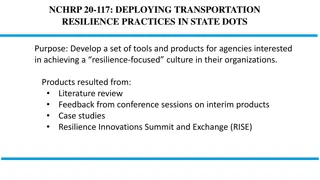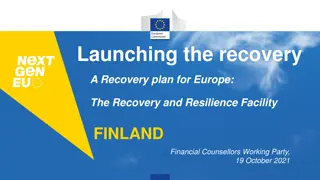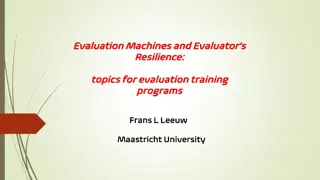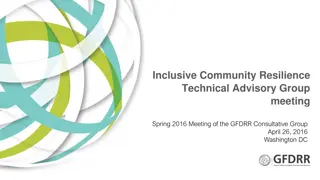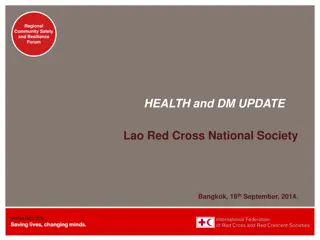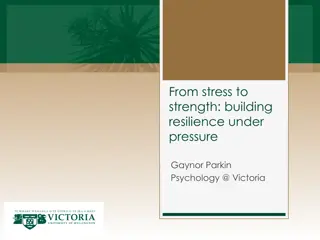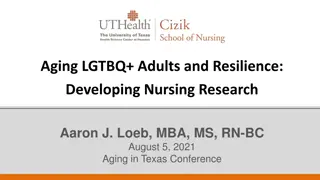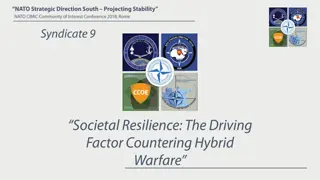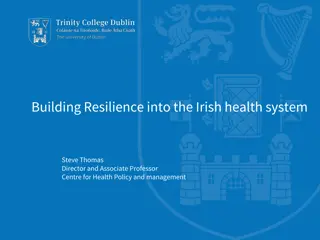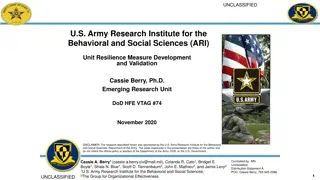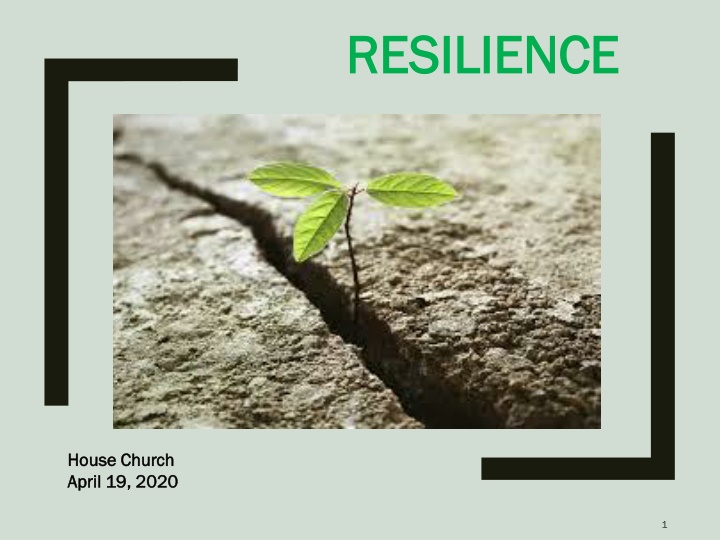
Unlocking Resilience: Lessons from Lucy Hone and The Power of Grit
Discover the key to resilience with insights from Lucy Hone's TED Talk and the Three Habits of Resilient People. Explore how to navigate tough times, cultivate grit, and bounce back stronger. Learn practical strategies to enhance your well-being and overcome life's challenges effectively.
Download Presentation

Please find below an Image/Link to download the presentation.
The content on the website is provided AS IS for your information and personal use only. It may not be sold, licensed, or shared on other websites without obtaining consent from the author. If you encounter any issues during the download, it is possible that the publisher has removed the file from their server.
You are allowed to download the files provided on this website for personal or commercial use, subject to the condition that they are used lawfully. All files are the property of their respective owners.
The content on the website is provided AS IS for your information and personal use only. It may not be sold, licensed, or shared on other websites without obtaining consent from the author.
E N D
Presentation Transcript
RESILIENCE RESILIENCE House Church House Church April 19 April 19, 2020 , 2020 1
Resilience Resilience The capacity to recover quickly from life s challenges; to spring back quickly into shape. 2
Todays Lesson Today s Lesson Lucy Hone. Ted Talk Video, Three Habits of Resilient People The Three Habits Grit and Faith The Habits Illustrated in the Life of the Apostle Paul How Will You Bounce Back? 3
Lucy Hone Lucy Hone Director of the New Zealand Institute of Wellbeing & Resilience Author of Resilient Grieving (The Experiment, 2018), the TED talk Three Habits of Resilient People, and the Educators Guide to Whole-school Wellbeing: A Practical Guide to Getting Started, Best- Practice Process and Effective Implementation (Taylor & Francis, 2020). She is also a contributor to Psychology Today. Masters in Applied Positive Psychology from the University of Pennsylvania and a Ph.D. from Auckland University of Technology. 4
Three Habits that Can Save You Dark Days Three Habits that Can Save You Dark Days 1. When tough times come, recognize that suffering is an inevitable part of human life, something that we share with all humanity. Stop asking, Why me? What you are experiencing is the norm. 2. Choose where to focus your attention. We tend to focus on the negative (Tiger vs. Rainbow). Focus on things you can change, accept as a part of your reality the things you can t change. Choose life. Tune into the good. Don t lose what you do have, because you are grieving about what you have lost. 3. Ask Is what I am doing helping me or hurting me? In tough times, resilient people do the things that are good for them. They take care of themselves, they accept into their lives the care and concern that others have for them, they find a good counselor, they love the people they love, they do the things they love, they trust in God. 6
Grit Grit Grit is passionate and sustained persistence in the face of adversity; stick-to-itiveness based on beliefs and actions that demonstrate a commitment to improving your future, even if the pursuit of your goals takes months, years, or even decades. Talent and IQ do not necessarily make you successful. What makes you successful is the belief that the future is not a permanent condition, that you can change it. Grit is a growth- mind-set that motivates learning and never accepts failure as a permanent condition. If you have grit, you are a person who works really hard to follow through on your commitments so that you can reach your goals. 7
Faith Inspires Grit Faith Inspires Grit Faith is the belief and the knowledge that we are loved by God and that our ultimate destiny is fixed in that love. Faith is the belief that God shares in, understands and empathizes with our suffering. In the being of God is the grief of losing a child to a brutal death God descended into hell. Faith means that we can know the God who experienced Good Friday, and then was powerful enough to follow it with Easter morning. The love and power of God brings life out of death, hope out of despair, joy out of sorrow, and light out of darkness. Faith motivates us to move forward with God in prayer and action, to learn, recover, transform our lives so that we are not defined by our failures or loses, but can grow into and experience abundant life with God as the norm. Faith inspires grit. Faith understands that the world is now not what God wants it to be, and that we, who are in God s image, are called to love and transform it. Dr. George Vaillant (Harvard Medical School): The only predictor of a person s ability to Dr. George Vaillant (Harvard Medical School): The only predictor of a person s ability to recover from alcoholism is belief in a higher power. recover from alcoholism is belief in a higher power. 8
The Apostle Paul The Apostle Paul An Exemplar of Resilience An Exemplar of Resilience 9
Paul Experienced Hard Times Paul Experienced Hard Times 2 Corinthians 11:23 2 Corinthians 11:23- -12:10 12:10 I have been in prison, I have been flogged severely, I have been exposed to death, again and again. Five times I received from the Jews forty lashes minus one. Three times I was beaten with rods. Once I was pelted with stones. Three times I was shipwrecked. I spend a night and a day treading water in the open sea. I have been in danger from rivers, in danger from bandits, in danger from the Jews, in danger from the Gentiles, in danger in the city, in danger in the country, in danger on the sea, in danger from false believers. I have labored and toiled, often going without sleep. I have known hunger and thirst, often going for long periods without food. I have been cold and naked. Besides everything else, I face the daily pressure of my concern for all the churches. I was given a thorn in my flesh, a messenger of Satan to torment me. Three times I asked the Lord to take it away from me. But he said to me, My grace is sufficient for you, for my power is made perfect in weakness. 10
Paul: Understand that Suffering is the Norm Paul: Understand that Suffering is the Norm I Corinthians 10:13, No temptation, no difficulty, no challenge has overtaken you, except what is common to humanity. Roman 8:18-25 Paul places our current sufferings in the context of the suffering of the whole created order. The creation is subjected to frustration, it is not what God intends it to be. The creation is groaning, as a woman in the pangs of childbirth (birthpangs). In the 1st century the phrase was a metaphor for helpless pain, frustration and futility. Even Christians, We ourselves grown inwardly as we wait for God to bring his plan to fruition. We want release from this suffering, so we eagerly stretch our necks so that we can see down the road and finally understand what all this chaos is about and how God will resolve it (rubber-necking delays). Our suffering is not unique, it is shared and experienced by the whole of humanity. The question is not Why me? The question should be, Why not me? Why should I be excluded from the rest of humanity? and then What am I going to believe and do about it? 11
Paul: Focus on the Positive Paul: Focus on the Positive Paul understood that in the midst of disruption we have a choice to focus on the negative or to focus on the positive. Without denying or ignoring the negative, he chose to focus on the positive. Philippians (context): Paul is in prison, in chains as he writes and is focused not on his imprisonment, but the fact that because of it, all the guards are becoming Christians! (Phil. 1: 12-14). In times of focus, where should we focus? The Lord is near, do not be anxious about anything but in every situation, through prayer and petition, with thanksgiving, let your requests be made known to God. And the peace of God, which passes all understanding, will guard your heart and minds in Christ Jesus. Whatever is true, whatever is honorable, whatever is right, whatever is pure, whatever is lovely, whatever is admirable, if anything is excellent or praiseworthy, think about such things (4:5-9). I have learned to be content in whatever the circumstances. I know what it is to be in need, I know what it is to have plenty. I have learned the secret of being content in every situation, whether well fed or hungry, whether living in plenty or in want. I can do all things through Christ who strengthens me (4:11-13) 12
True Grit: John Wayne Had Nothing on Paul True Grit: John Wayne Had Nothing on Paul Paul exemplified true grit, no matter what happened, he never gave up, he kept pressing forward. No matter the obstacle, he ran the race that God had set before him, not a sprint, but a marathon the energizer bunny personified! Philippians 3:10-14 (Paul s Dominant Desire, his prime motivation): I want to know Christ, to know the power of his resurrection and the participation in his sufferings. I haven t obtained it yet, but it s my goal. So one thing I do is this: Forgetting what is behind me, and straining toward what is ahead, I press forward to win the prize that God has set before me. Paul s grit, now 2000 years later, continues to influence and motivate Christians. Paul never said it would be easy. Ephesians 6: Grit means preparing for battle (inside and outside): Be strong in the Lord and in his mighty power. Put on the full armor of God, so that you can take your stand against the devil's schemes. Stand firm with the belt of truth buckled around your waist, with the breastplate of righteousness in place, and with your feet fitted with the readiness that comes from the Gospel of peace. In addition take up the shield of faith, with which you can extinguish all the flaming arrows of the evil one. Armed with you faith in a mighty God, create allies and go to battle with your self-doubt, self-pity, fear of change, with the naysayers who will tell you that all is lost or that the possible is impossible. I can do all things through Christ who strengthens me (Philippians 4:13). As Christians, go to battle in the world with an attitude of service for so many need your words of comfort, encouragement and support. 13
Paul: Faith Is Grounded in Gods Love Paul: Faith Is Grounded in God s Love In a world where suffering is the norm, why should Christians have hope and vitality? How is it that we can handle it differently that those without faith? Paul s hope, his grit was grounded in God s love, in the fact that nothing could separate him from that love, and that because God loved him, God was working everything he experienced for good. In spite of the fact that the creation is groaning, that we might be groaning, and not even have the words to pray about it (Romans 8:26), Paul asserts three things that are central to the Christian faith that give us hope: God helps us in our weakness. Even when we feel disconnected from God, the Spirit is searching our hearts, making wordless prayers to God on our behalf (Romans 8:26-27). For those who love God, in all things God is working for good (v. 28) No disruption, no loss, no failure, nothing can separate us from the love of God. Who shall separate us from the love of Christ? Shall trouble, or hardship, or persecution, or famine, or nakedness, or danger, of sword? No in all these things we are more than conquerors through him who loved us. For I am convinced that neither death nor life, neither angels nor demons, neither the present nor the future, nor any powers, neither height nor depth not anything else in all creation will be able to separate us from the love of God in Christ Jesus our Lord (vv. 31-39). 14
Paul: Faith Motivates Service in Times of Trouble Paul: Faith Motivates Service in Times of Trouble Paul s faith was grounded in God s love, which he believed motivates our acts of love and service to others even in our own times of need. Contexts: There was a great famine in Jerusalem (AD 45-55). The Christians there were particularly affected due to persecution by Pharisees who opposed Christianity (Paul himself, had been one of the persecutors). Now he is taking up a collection from the churches he founded in Greece and Asia Minor, to help their fellow-Christians in Jerusalem (1 Corinthians 16:1-3). They themselves were suffering, impoverished and yet they still gave to those who were worse off than they. Paul writes (2 Corinthians 8): We want you to know about the grace that God has given to the Macedonian Churches. In the midst of a very severe trial, their overflowing joy and their extreme poverty welled up in rich generosity, they gave as much as they were able, even beyond their ability. They urgently pleaded with us for the privilege of participating in this service. God is able to bless you abundantly, so that in all things, in all times, having all that you need, you will abound in every good work. 15
Francis Ridley Havergal: Take My Life and Let It Be Francis Ridley Havergal: Take My Life and Let It Be Take my life, and let it be, Consecrated, Lord, to Thee; Take my moments and my days, Let them flow in ceaseless praise, Let them flow in ceaseless praise. Take my hands, and let them move, At the impulse of Thy love; Take my feet and let them be, Swift and beautiful for Thee, Swift and beautiful for Thee. Take my voice, and let me sing, Always, only, for my King; Take my lips, and let them be, Filled with messages from Thee, Filled with messages from Thee. Take my silver and my gold; Not a mite would I withhold; Take my intellect, and use Every power as Thou shalt choose, Every power as Thou shalt choose. Take my will, and make it Thine; It shall be no longer mine. Take my heart; it is Thine own; It shall be Thy royal throne, It shall be Thy royal throne. Take my love; my Lord, I pour at Thy feet its treasure-store. Take myself, and I will be Ever, only, all for Thee, Ever, only, all for Thee Francis Ridley Havergal (1836 Francis Ridley Havergal (1836- -1879): Frances was a brilliant scholar, teacher, writer, musician and 1879): Frances was a brilliant scholar, teacher, writer, musician and composer, fluent in Greek, Hebrew and several other modern languages. A promising career was composer, fluent in Greek, Hebrew and several other modern languages. A promising career was open before her, but in her 30 s she contracted peritonitis, an inflammation of the stomach lining open before her, but in her 30 s she contracted peritonitis, an inflammation of the stomach lining that caused constant severe pain, fever and weight loss. Several year later, at the age of 42, she died that caused constant severe pain, fever and weight loss. Several year later, at the age of 42, she died of this disease. Two years before she died, one night when she was in deep pain, she learned about of this disease. Two years before she died, one night when she was in deep pain, she learned about a family of ten that lived nearby that was in desperate need. The parents were very sick and a family of ten that lived nearby that was in desperate need. The parents were very sick and bedridden, their children were hungry and scared. She immediately went to their home, nursed the bedridden, their children were hungry and scared. She immediately went to their home, nursed the parents, fed and calmed the children and stayed with them all night. The next morning she parents, fed and calmed the children and stayed with them all night. The next morning she composed this hymn Take My Life. Frances said, Seldom can a heart be lonely when it seeks one composed this hymn Take My Life. Frances said, Seldom can a heart be lonely when it seeks one lonelier still. lonelier still. 16
Apostle Paul: An Exemplar of Resilience Apostle Paul: An Exemplar of Resilience Paul failed, suffered, his work and mission were blocked over and over, his life was filled with disappointments. Paul understood that the obstacles and suffering he experienced were commonly experienced by all humanity. Paul focused his thoughts and attention on the positive, a high calling. Paul exemplified true grit, he never gave up, he kept pressing forward, he ran the race that God had set before him, not a sprint, but a marathon throughout his life. Paul s faith was grounded in God s love, in the fact that God understood his weaknesses, that nothing could separate him from that love, and that because God loved him, God was working everything he experienced for good, in life and in death. Paul understood that because the world is now not what God wants it to be, we, who are in God s image, are called to love, serve, and transform it. 17
How about Us? How about Us? Our suffering, failures, grief, or sins are not unique we are a part of the human race. The question is not, Why me? It s Why not me? We can choose where to focus our attention; don t lose the good you have, because you re so focused on what you have lost. Act in ways that are good for you. Recognize when you re wading through the swamp of despair; you can still choose to do what is good for you. Develop a gritty personality. You are going to make it. Follow through on your commitments. Learn and transform yourself even if it takes tremendous effort and a lot of time. Believe that God loves you; that you destiny is fixed in God s love. Experience and share that love with others. Let that love and security motivate you to move forward. Understand that the world is now not what God wants it to be, and that we, who are in God s image, are called to love and transform it with loving words and inspired acts of service. 18
Text, email or call me if you want to talk about any of this: Text, email or call me if you want to talk about any of this: Paul Feiler Paul Feiler pfeiler51@gmail.com pfeiler51@gmail.com 713 713- -256 256- -9039 9039 19








